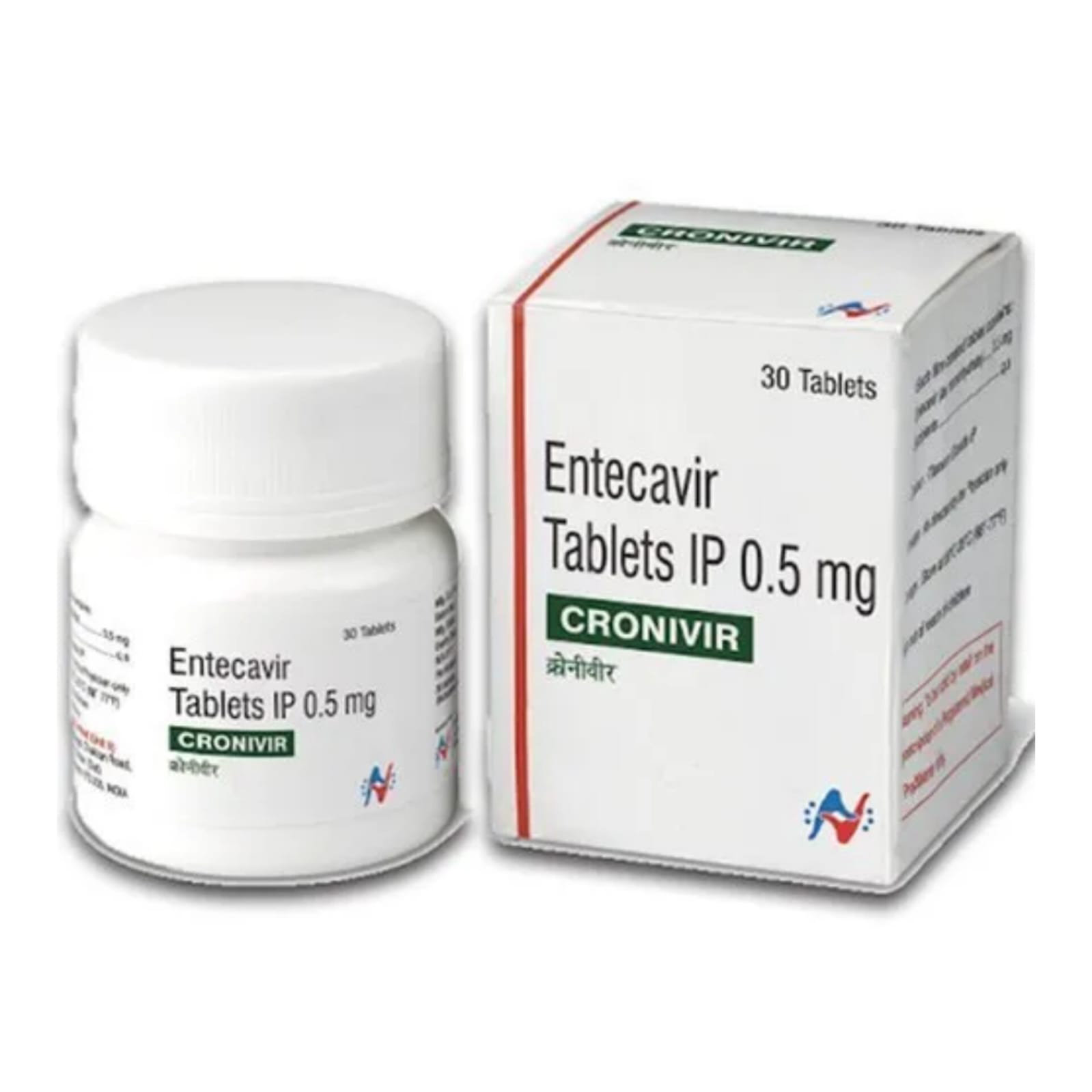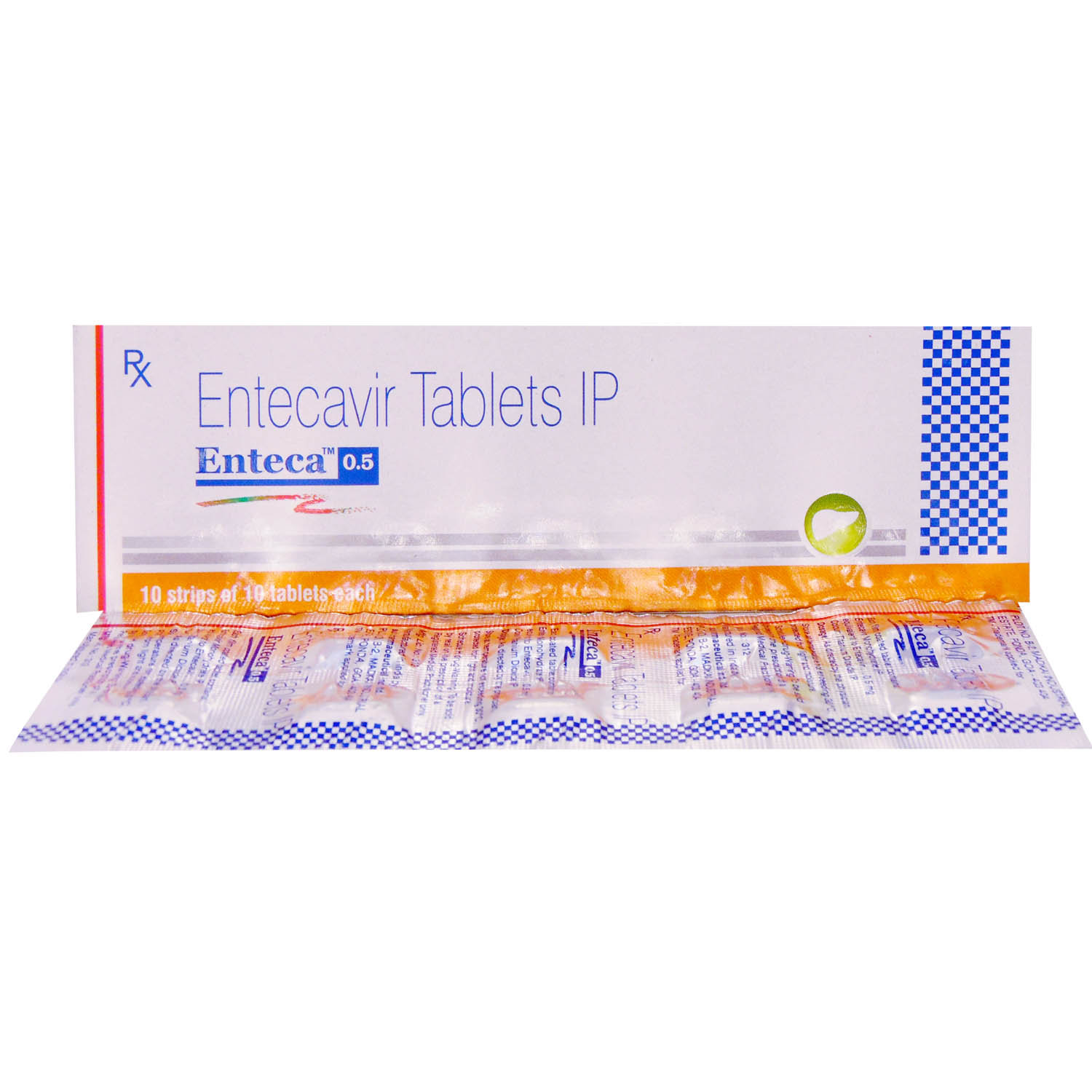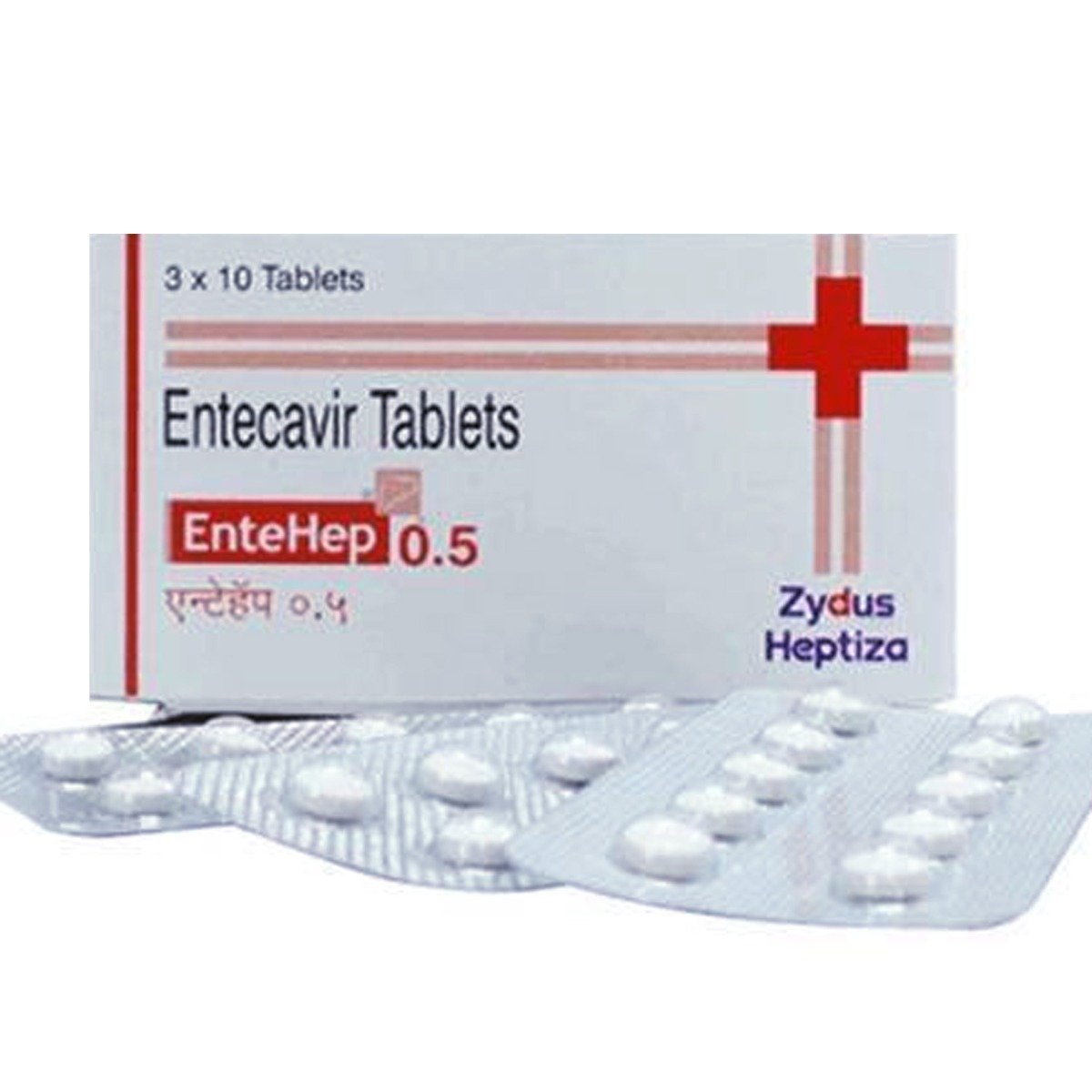Entecavir
About Entecavir
Entecavir belongs to a class of drugs called antivirals used to treat chronic hepatitis B virus (HBV) infection. Hepatitis B is a severe liver infection caused by the hepatitis B virus (HBV). It is highly contagious (spreads from one person to another) and spreads through intimate contact with the infected person, direct contact with infected blood, being pricked with a contaminated needle, using a razor or any other personal items with leftovers of infected fluid or even transfer from mother to baby during birth.
Entecavir contains Entecavir, an antiviral drug that works by inhibiting viral DNA polymerase enzyme action in the liver cells that is essential for the virus to multiply. Thereby, it stops the virus from making new viruses and reduces the amount of hepatitis B virus in the body.
Take Entecavir as prescribed by your doctor. You are advised to take Entecavir for as long as your doctor has prescribed it for you based on your medical condition. In some cases, you may experience dizziness, headache, nausea, vomiting, drowsiness, extreme tiredness, insomnia (inability to sleep), diarrhoea, or indigestion. Most of these side effects of Entecavir do not require medical attention and gradually resolve over time. However, if the side effects persist or worsen, please consult your doctor.
If you are allergic to Entecavir or any other medicines, please tell your doctor. If you are pregnant or breastfeeding, please consult a doctor before taking Entecavir. It is recommended to use effective contraceptive methods while using Entecavir to avoid pregnancy. Entecavir is not recommended for children below 2 years of age. If you experience stomach pain, vomiting, or nausea while taking Entecavir, it might indicate lactic acidosis development. This rare but serious side effect has occasionally been fatal. Lactic acidosis occurs more often in women, particularly if they are very overweight. Your doctor will monitor you regularly while you are receiving. If you have HIV/AIDS, kidney or liver problems, inform your doctor before taking Entecavir.
Uses of Entecavir
Medicinal Benefits
Entecavir contains Entecavir, an antiviral drug used to treat chronic hepatitis B virus (HBV) infection. Entecavir works by inhibiting viral DNA polymerase enzyme action in the liver cells that is essential for the virus to multiply. Thereby, it stops the virus from making new viruses and reduces the amount of hepatitis B virus in the body. Thus, decreases damage to the liver and improves liver functioning.
Directions for Use
Storage
Side Effects of Entecavir
- Dizziness
- Headache
- Nausea
- Vomiting
- Drowsiness
- Extreme tiredness
- Insomnia (inability to sleep)
- Diarrhoea
- Indigestion
Drug Warnings
If you are allergic to Entecavir or any other medicines, please tell your doctor. If you are pregnant or breastfeeding, please consult a doctor before taking Entecavir. It is recommended to use effective contraceptive methods while using Entecavir to avoid pregnancy. Entecavir is not recommended for children below 2 years of age. You are advised to take proper precautions if you are infected with hepatitis B virus infection to prevent infection spread to others through sexual contact or body fluids. Hepatitis B vaccine should be taken to prevent Hepatitis B virus infection. If you experience stomach pain, vomiting or nausea while taking Entecavir, it might indicate lactic acidosis development. This rare but serious side effect has occasionally been fatal. Lactic acidosis occurs more often in women, particularly if they are very overweight. Your doctor will monitor you regularly while you are receiving. If you have HIV/AIDS, kidney or liver problems, inform your doctor before taking Entecavir.
Drug Interactions
Drug-Drug Interaction: Entecavir may interact with a pain killer (celecoxib), and medicine used to treat bone diseases (zoledronic acid).
Drug-Food Interaction: No interactions found.
Drug-Disease Interaction: If you have HIV/AIDS, kidney or liver problems, inform your doctor before taking Entecavir.
Drug-Drug Interactions Checker List:
Safety Advice

Alcohol
cautionInteraction of alcohol with Entecavir is unknown. Please consult a doctor before consuming alcohol while using Entecavir.

Pregnancy
cautionEntecavir is a category C pregnancy drug and is given to pregnant women only if the doctor thinks benefits outweigh risks.

Breast Feeding
cautionIt is unknown whether Entecavir is excreted in human milk. Therefore, please consult a doctor if you are breastfeeding. Entecavir is given to breastfeeding mothers only if the doctor thinks benefits are greater than risks.

Driving
cautionEntecavir may cause dizziness, drowsiness or tiredness in some people. Therefore, avoid driving or operating heavy machinery if you feel dizzy, drowsy or tired after taking Entecavir.

Liver
cautionTake Entecavir with caution, especially if you have a history of Liver diseases/conditions. The dose may be adjusted by your doctor as required. Please consult a doctor.

Kidney
cautionTake Entecavir with caution, especially if you have a history of Kidney diseases/conditions. The dose may be adjusted by your doctor as required. Please consult a doctor.

Children
cautionEntecavir is not recommended for children below 2 years or weighing less than 10 kg. However, in children above 2 years, Entecavir should be used with caution and doses prescribed by a doctor.
Habit Forming
Diet & Lifestyle Advise
- Include plenty of vegetables and fruits, and whole grains such as brown rice, oats, quinoa, and barley.
- Eat lean protein such as skinless chicken, fish, beans, and egg whites.
- Include healthy fats like avocados, olive oil, and nuts.
- Eat low-fat or non-fat dairy products to minimize damage to the liver.
- Drink plenty of water for better processing of food by the body.
- Avoid sugary foods such as cake, cookies, packaged baked food, or soda. Also, avoid heavy salt foods.
- Avoid foods containing saturated fats such as fried foods, fatty cuts of meat, sour cream, butter, and other high-fat dairy products as they may lead to weight gain and result in fatty liver.
- Avoid smoking and alcohol consumption as they may increase the risk of liver damage.
Special Advise
Regular blood tests are recommended while taking Entecavir and several months after treatment with Entecavir to monitor liver functioning.
Patients Concern
Disease/Condition Glossary
Hepatitis B: It is a severe liver infection caused by the hepatitis B virus (HBV). It is highly contagious (spreads from one person to another) and spreads through intimate contact with the infected person, direct contact with infected blood, being pricked with a contaminated needle, using a razor or any other personal items with leftovers of infected fluid or even transfer from mother to baby during birth. The virus can live for up to 7 days outside the body. Chronic hepatitis B develops slowly, and the symptoms may not be clear unless complications develop. The symptoms of hepatitis B may appear after 3 months of exposure to the virus and can last for 2 to 12 weeks. The complications of chronic hepatitis B include liver failure, liver cancer or liver cirrhosis (scarring). Hepatitis B can be prevented by taking the vaccination.
FAQs
Entecavir contains Entecavir, an antiviral drug that works by preventing viral DNA polymerase enzyme action in the liver cells that is essential for the virus to multiply. Thereby, it stops the virus from making new viruses and reduces the amount of hepatitis B virus in the body.
Yes, hepatitis B virus infection is highly contagious and spreads from one person to another. Therefore, it is recommended to avoid sharing personal items or needles containing an infected person's blood or body fluids.
Entecavir may cause lactic acidosis (excess of lactic acid in the blood), a rare but a severe side effect, especially in women who are very obese. However, if you experience stomach pain, vomiting or nausea while taking Entecavir, please consult a doctor immediately.
You are not recommended to take Entecavir with celecoxib (painkiller), as it may increase the blood levels of Entecavir, leading to more adverse effects and may also affect kidney function. However, please consult your doctor before taking Entecavir with other medicines.
Entecavir does not cure hepatitis B virus infection. Entecavir reduces the amount of hepatitis B virus in the body and improves liver functioning by decreasing liver damage.
Entecavir is not recommended for hepatitis B patients with HIV infection unless they are taking medicines to treat HIV infection at the same time as Entecavir may cause HIV infection to become resistant to certain HIV drugs and reduce their effectiveness. Therefore, it is advised to get tested for HIV infection before taking Entecavir.
You are not recommended to stop taking Entecavir without consulting your doctor as it may worsen the infection or cause recurring symptoms. Therefore, take Entecavir for as long as your doctor has prescribed it, and if you experience any difficulty while taking Entecavir, please consult your doctor.








